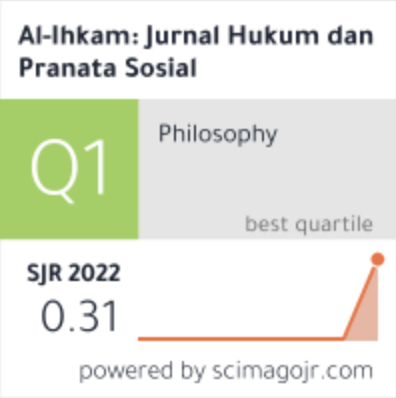Tarjih Maqashidi of Granting Remission for Terrorist Convict in Indonesia
 Abstract views: 467
,
Abstract views: 467
,
 pdf downloads: 419
pdf downloads: 419
Abstract
The problem of the deradicalization policy of terrorist convicts is in the regulation of granting remissions for terrorism convicts because terrorist convicts can manipulate the conditions for granting remission to pretend to be good and cooperative (taqiyah) during their criminal period in prison, so that they can quickly gain freedom and return to the network. This empirical research was processed descriptively. Data collection was carried out through field research at the Class I Lapas Surabaya prison and Class II B Lamongan prison through a phenomenological approach, interpretive paradigm, and tarjih maqashidiy analysis. This study concludes that granting remissions to terrorism convicts has a more significant advantage (maslahah) than eliminating remissions on the grounds of extraordinary crimes. Providing the opportunity to change behavior is better prioritized than providing punishment without any attempt to change the behavior of terrorist prisoners with the maximum penalty.
(Salah satu problematika yang muncul dari kebijakan deradikalisasi narapidana terorisme adalah aturan perihal pemberian remisi bagi narapidana terorisme dengan syarat kelakuan baik dan kooperatif (taqiyah) selama menjalani masa pidana. Padahal, mereka bisa berpur-pura baik agar segera keluar dari penjara dan kembali ke jaringan lamanya. Penelitian empiris ini diolah secara deskriptif sementara pengumpulan datanya dilakukan melalui observasi dan wawancara di Lapas Kelas I Surabaya dan Kelas II B Lamongan dengan pendekatan fenomenologi, paradigma interpretif, dan analisis tarjih maqashidi. Studi ini menyimpulkan bahwa pemberian remisi pada narapidana terorisme memberikan keuntungan yang lebih signifikan (maslahah) dibanding menghapus kebijakan tersebut dengan alasan kejahatan luar biasa yang dilakukan narapidana. Memberikan kesempatan mereka untuk berubah lebih baik dianggap lebih utama dan layak diprioritaskan dibanding memberi hukuman maksimal tanpa usaha apapun untuk mengubah perilakunya.)
Downloads
In order to be accepted and published by Al-Ihkam: Jurnal Hukum dan Pranata Sosial, author(s) submitting the article manuscript should complete all the review stages. By submitting the manuscript, the author(s) agreed to the following terms:
- The copyright of received articles shall be assigned to Al-Ihkam: Jurnal Hukum dan Pranata Sosial as the publisher of the journal. The intended copyright includes the right to publish articles in various forms (including reprints). Al-Ihkam: Jurnal Hukum dan Pranata Sosial maintain the publishing rights to the published articles.
- Authors are permitted to disseminate published articles by sharing the link/DOI of the article at Al-Ihkam: Jurnal Hukum dan Pranata Sosial. Authors are allowed to use their articles for any legal purposes deemed necessary without written permission from Al-Ihkam: Jurnal Hukum dan Pranata Sosial with an acknowledgment of initial publication to this journal.
- Users/public use of this website will be licensed to CC-BY-SA.



.png)
_1.png)










